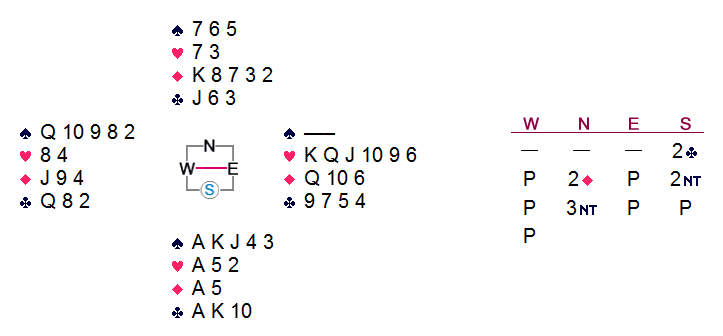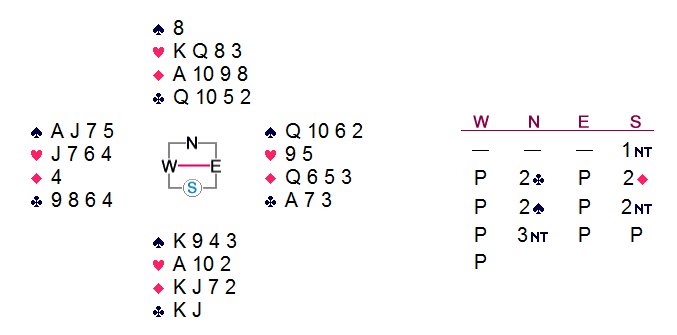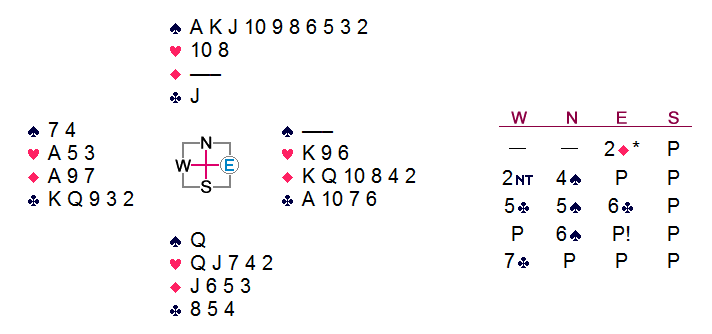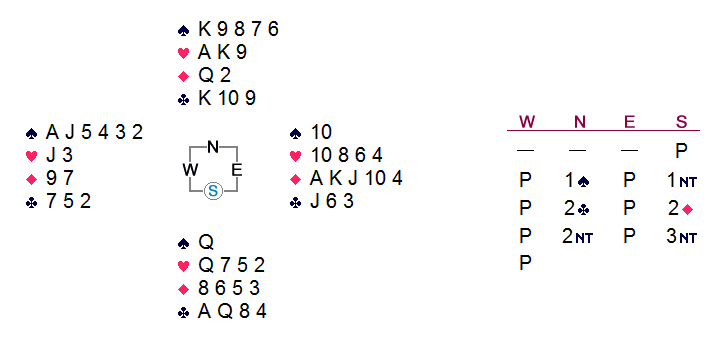

 |
 |
The 72nd All-Western Championships
Part II: the Final
Having finished third-best in the qualifying rounds, my partner and I found
ourselves in the 52-pair final of this premier event.

POOR BID, GOOD PLAY: Board 25, first final session

This gem featured a a most uncommon 3-suit, non-material 'submarine' squeeze; but the patient ultimately died.
Having no clue as to declarer's distribution, west's opening lead was a normal ten of spades. East (a friend) muttered something about a "killing opening lead" as I won the jack. A low heart was taken by east, who continued with another heart (not that it mattered), ducked again. A third heart was led, and west was immediately squeezed out of his exit card in diamonds.
The ace and king of diamonds were cashed, followed by the ace of clubs and
three rounds of spades. West was able to cash his two spade winners; but
he then was compelled to lead away from his club queen. Making three
notrump. This exotic strip and endplay garnered only 10 of 25 matchpoints,
because the field was in 4♠ making, and some of those
contracts were doubled! In fact, the major-suit game was equally
unbeatable; I'll leave that part of the analysis to you.
On the basis of his doubleton small heart holding, partner should have checked
back for a 5-card spade suit (we had the tools). Had the dummy held
as many as three hearts, then 4♠ could have been defeated,
and my matchpoint score would have been a lot better.

BAD PLAY: Board 9, second final session

In a Puppet-Stayman auction, it was revealed that dummy had a 4-card
heart suit and declarer held four spades. The opening lead was the club nine;
east grabbed his ace and placed the ten of spades upon the table —
the defense's only chance. Declarer immediately rose with the king and
promptly defeated himself in an unbeatable contract. West captured the spade
king with the ace and returned the five to partner's queen. A third spade
lead trapped south's nine-spot, enabling the defense to win four spades plus
the ace of clubs.
We'll never know whether declarer — one of those allegedly good players we
talked about earlier — was simply trying to score the maximum number of
tricks, or whether he didn't recognize the simple safety play of ducking the first
spade, then covering east's next lead in the suit. Of course, it would still
have been necessary to guess one of the red suits later; but at least he would have
had a chance.

GOOD BIDDING, AND NOT SUCH GOOD BIDDING: Board 26, second final session

East's 2♦ opening bid showed 11-15 hcp with at least
5-4 in the minors — a sort of Inverse Flannery! Responder's
2NT was a forcing inquiry. After west's subsequent
5♣ bid, east could see a slam opposite as little as solid
trumps and one of the red aces. When north persisted to 6♠,
east was offered the rare opportunity to make a void-showing forcing
pass. Now west could see a grand slam opposite nothing more than the top
two diamonds plus the ace of clubs! Opener hardly would have invited a further
bid missing any of those key cards; the heart king should be there as well; but it
was unlikely to be needed.
At that juncture, north would have done best to bid one more time, for an
800-point sacrifice. There was an element of doubt, however, as to
whether his opponents could actually make a grand slam, so he sold out for
-2140 and 4% of the matchpoints.

GREAT DEFENSE: Board 24, second final session

This deal showcased a world-class defensive maneuver by a couple of young women who just happen to be the reigning Swedish Junior Champions.
The opening lead was the jack of hearts. Declarer called for dummy's
ace, and east played the ten! In so doing, she had given up her
heart stopper; but more importantly, her partner knew it. This was a
so-called alarm-clock signal, intended to alert partner
that something special was afoot.
At trick two, my partner played a spade to the queen. West grabbed the ace and switched smartly to diamonds, scuttling the contract by two tricks. In light of the bidding, it might otherwise have been difficult for west to find the killing switch.
From east's perspective, giving up the heart stopper could lose the contract
only if declarer held five clubs; but with that holding, he surely would have
raised that suit on his second bid, rather than mentioning such an anemic
diamond holding. And yes, declarer didn't actually have sufficient power
to succeed in any case, but a sure thing always is preferable to its
alternative. Consider what might have resulted if declarer had held the
doubleton ♠QJ.

Our score on this last board knocked us out of the overalls on the penultimate round of the event. But it was almost worth it to witness this expert play at the table.